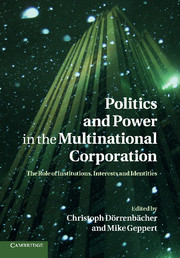 Politics and Power in the Multinational Corporation
Politics and Power in the Multinational Corporation Published online by Cambridge University Press: 26 April 2011
Introduction
The study of politics and power inside multinationals has made significant strides over the last decade. No longer is it possible to treat MNCs simply as rational unitary actors pursuing efficiency logics in competitive markets and selecting appropriate forms of organizational structure depending on the contingent characteristics of particular sectors. Instead, we now have a view of MNCs as consisting of different types of social actors with differing interests and power derived from their distinctive institutional origins. These interests and powers are embedded within the particular strategic and operational positions that subsidiaries and actors occupy within the MNC and the places which they take up within global value chains. In turn this is embedded in the dynamics of global competitive markets that provide the performance outcomes crucial to the survival and growth of firms. Internally, therefore, MNCs are shaped by the ways in which different actors are constituted as collective interests and identities by these processes and how they interact with other actors inside and outside the MNC. From this perspective, the MNC is neither a Weberian rational legal bureaucracy nor an “internal market” but rather a “contested terrain” (Collinson and Morgan 2009; Edwards and Bélanger 2009). Many of the chapters in this book and other recent papers by the editors and authors have contributed substantially to extending our understanding of these processes (Becker-Ritterspach and Dörrenbächer 2009; Blazejewski 2009; Dörrenbächer and Geppert 2006, 2009; Gammelgaard 2009; Geppert et al. 2003; Geppert and Matten 2006; Geppert and Williams 2006).
To save this book to your Kindle, first ensure [email protected] is added to your Approved Personal Document E-mail List under your Personal Document Settings on the Manage Your Content and Devices page of your Amazon account. Then enter the ‘name’ part of your Kindle email address below. Find out more about saving to your Kindle.
Note you can select to save to either the @free.kindle.com or @kindle.com variations. ‘@free.kindle.com’ emails are free but can only be saved to your device when it is connected to wi-fi. ‘@kindle.com’ emails can be delivered even when you are not connected to wi-fi, but note that service fees apply.
Find out more about the Kindle Personal Document Service.
To save content items to your account, please confirm that you agree to abide by our usage policies. If this is the first time you use this feature, you will be asked to authorise Cambridge Core to connect with your account. Find out more about saving content to Dropbox.
To save content items to your account, please confirm that you agree to abide by our usage policies. If this is the first time you use this feature, you will be asked to authorise Cambridge Core to connect with your account. Find out more about saving content to Google Drive.